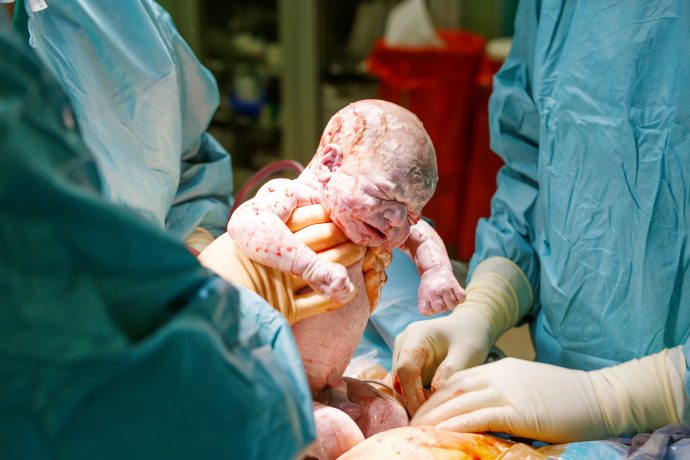Method of delivery can influence the bacteria in infants’ guts, according to a new study, but differences have been found to disappear within nine months
Babies born by Caesarean section have different gut bacteria to those delivered vaginally, the largest and most comprehensive study to date on the baby microbiome has found, offering clues about the development of the human immune system, researchers said.
“Babies born vaginally seem to have acquired most of their gut bacteria from their mother, and the acquired bacteria were found in their mother’s gut,” says Trevor Lawley, a microbiologist at the Wellcome Sanger Institute in Hinxton, UK, who led the work, published in Nature on Sept 18.
But C-section babies did not, and instead had more harmful pathogens picked up in the hospital that could expose them to future infections – pathogens that were more likely to have antimicrobial resistance – compared to vaginally delivered babies.
Scientists from University College London, Wellcome Sanger Institute and Birmingham University used DNA sequencing to analyse more than 1,600 gut bacteria samples from 175 mothers and almost 600 babies.
The more common bacteria found in babies born by Caesarean were bacteria associated with hospital settings.
The research could help shed light on previous studies that suggested babies with a lack of exposure to certain microbes in early life had a slightly higher risk of autoimmune diseases such as asthma, allergies and diabetes.
It is not clear what impact the difference may have on a child’s future health, and the findings shouldn’t deter expectant mothers from having C-section births, the scientists leading the work said.
“Women often need a Caesarean, or some women choose Caesarean, and although this is ground-breaking research, at the moment this should not deter women from having a Caesarean section,” says Alison Wright of the UK Royal College of Obstetricians and Gynaecologists.
This so-called “baby biome” project – the world’s largest such study – had opened a window on a little-understood stage in the development of human immunity, they added. “The first weeks of life are a critical window of development of the baby’s immune system, but we know very little about it,” said Peter Brocklehurst, a Birmingham University professor who co-led the study.
The gut microbiome is a complex ecosystem of millions of microbes and is thought by scientists to be important for how the immune system develops.
But scientists have not yet been able to work out how important the initial gut microbiome – or “baby biome” – is to future immunity and health, or how a baby’s microbiome develops, or what happens to it with different modes of birth.
In samples from mothers and from the babies at four, seven and 21-days-old, the team found there was a significant difference between the two delivery methods – with vaginally delivered babies having many more health-associated bacteria from their mothers than babies born by Caesarean.
“At the moment we don’t understand the long-term consequences of this,” Brocklehurst said at a press conference about the results. He further added, “We need to follow up … these babies as they grow to see if early differences in the microbiome lead to any health issues.”



Comments